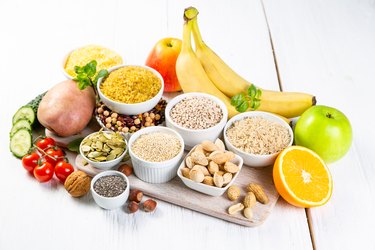
Your thyroid gland is part of your endocrine system and produces the hormones responsible for regulating metabolism. If your thyroid overproduces hormones, called hyperthyroidism, treatment can include surgical removal of your thyroid or radioactive iodine to completely shut down all thyroid function.
Your thyroid may also be removed in cases of thyroid cancer. Without a functional thyroid, you'll need to take supplemental replacement thyroid hormones to regulate your metabolism. Low thyroid hormone levels, known as hypothyroidism, can be helped with dietary changes, although you will need to take replacement hormones for the rest of your life.
Video of the Day
Video of the Day
Thyroid and Metabolism
Your thyroid produces T3 and T4, two hormones that control how quickly your body uses energy and oxygen — which determine how fast your body burns calories. The less hormones you produce, the slower your metabolism and the easier it is to gain weight.
After your thyroid is shut down or removed, you may experience weight gain as you try to find the correct dosage of thyroid hormone replacement. You can help increase your metabolism by burning more calories through physical activity.
Although it helps to cut calories, if you don't eat enough calories, you could slow your metabolism down further. Your body has a built-in survival mechanism that slows metabolism to conserve energy when you don't consume enough calories. You need at least 1,200 calories daily to keep your metabolism from slowing down.
General Diet Guidelines
Unless you have another underlying medical issue, you should follow the Dietary Guidelines for Americans. The guidelines suggest that the majority of your diet come from complex carbohydrates — between 45 and 65 percent. Between 10 and 35 percent of your diet should be lean protein and between 25 and 35 percent should come from healthy fat.
Try to avoid added sugars, especially in sweetened beverages such as soda, and limit saturated and trans fats in your diet. You can cut down on saturated fat by choosing lean cuts of meat, and choosing poultry and seafood instead of beef or pork. Eat low-fat or nonfat dairy and use vegetable oils in place of butter or lard.
Watch Those Goitrogenic Foods
Certain foods, specifically cruciferous vegetables and products that have soy isoflavones, contain goitrogenic compounds — chemicals that can interfere with thyroid hormones. A goiter is a swelling or enlargement of the thyroid, which can happen if the thyroid gland is functional and tries to grow more cells to keep up with the demand for hormones.
Because your thyroid is inactive, you don't have to worry about a goiter forming, but you still have to account for the effect of the goitrogenic compounds on your supplemental thyroid hormones — especially because you cannot naturally make more hormones to compensate.
Goitrogenic compounds in vegetables are often deactivated by heating; don't eat broccoli, cabbage or other cruciferous vegetables raw. Note that the goitrogenic effects of soy are lessened if the soy is fermented — in products such as miso and tempeh.
Read more: Can Cardio Boost Metabolism?
Importance of Physical Activity
No diet plan would be complete without regular physical activity. Strength training exercises are especially important for people without a thyroid because building lean muscle mass will help burn more calories. Even at rest, muscle tissue requires more energy than fat. The greater your ratio of muscle to fat, the higher your metabolism. All forms of physical activity help to burn calories — and anything that burns calories will boost metabolism and help keep you at a healthy weight.